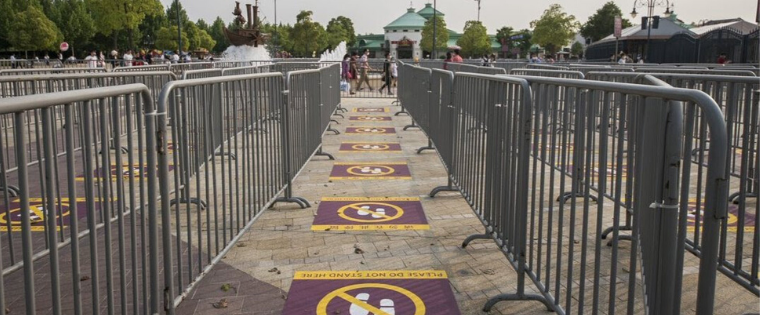If They Re-Open, Will They Come?

That’s a vexing question for many businesses that came into sharp relief as Disney released earnings Tuesday that detailed financial damage wrought by the pandemic.
The entertainment and sports industries rely heavily on packed stadiums, cruise ships, theme parks and theaters as a business staple. And many of those businesses are core brandbuilders for manufacturers, service providers and retailers who create licensing-based commerce out of what goes on in those venues.
Key drivers of licensed goods
The entertainment/character, sports, collegiate and music categories account for nearly six of every ten dollars that consumers spends on licensed products and services around the world, and the pandemic has put a real crimp in that marketing chain.
At the moment, there’s talk of the first U.S. movie theaters potentially reopening in July – WarnerMedia’s Tenet (July 17) and Disney’s Mulan (July 24) are currently slated to be first released. In Europe, Japan, China and South Korea the timetables for reopening movie theaters vary and have been a moving target.
Meanwhile, major sports leagues around the world are creating multiple contingency plans about how they might be able to open up for even partial seasons – in most cases without fans in the seats. And theme parks everywhere remain closed, though some have begun to formulate way they may be able to operate in a socially-distanced world.
For example, Disney plans to reopen Shanghai Disney Resorts on May 11, but with “far less” capacity than the 30% (24,000) mandated by the Chinese government; visitors and Disney employees will wear face masks, Disney CEO Bob Chapek told analysts. Disney will put limits on attendance with advanced registration and entry systems and control “guest density” with social distancing, Chapek said. Plans for other Disney parks are uncertain.
The cost of empty seats
The constraints on the numbers of people who can visit a theme park, go to a movie theater or watch a live baseball game are a major hurdle for industries whose business models rely in large part on ticket and concession revenues, including merchandise. And that will be in addition to new operating costs tied to health and safety precautions such as face masks, temperature checks and ample supplies of hand sanitizer.
NBCUniversal’s theme parks break even at 50% of capacity and would post a $500 million loss if they remain closed through June, CFO Mike Cavanagh said. To offset the closures, Universal has indefinitely delayed plans for Epic Universe in Orlando, but expects to open Super Nintendo World at Universal Studios Japan this year “a few months” late and will open Universal Beijing Resort in China in May 2021, Cavanagh said. Super Nintendo World also is to be part of Epic Universe.
“Our priority is going to be to make the parks safe, and so we’re not going to push for attendance,” said Cavanagh. “But at pretty low levels of attendance as things ramp up, we’ll be in better shape than were the parks to be closed.”
And AMC Theaters and Cinemark have developed detailed seating plans that limit its theaters to 20-30% of capacity. At the same time, though, studios have moved many big films back, often into 2021.
Restarting Sports
In Europe, professional soccer leagues have either curtailed seasons or postponed them.
In North America, the major sports leagues are exploring a variety of scenarios for playing at least some games this year; most would be in empty stadiums, but would be aimed at keeping their sports alive for fans at home, as well as providing programming for broadcast and other media partners.
The NHL has discussed finishing out the 2019-2020 season in four arenas with three games per day. The NBA hasn’t set a date for resuming the regular season, but is weighing starting the 2020-21 season in December and running it through July 2021. MLB Commissioner Rob Manfred “fully anticipates” playing a regular season this year, but plans aren’t expected to be finalized until late this month. And the NFL, not due to kick off until Sept. 10, start, has discussed delaying the season to October and pushing the Super Bowl to late February.
Taiwan’s Chinese Professional Baseball League was among the first to resume play on April 12, with nobody in the stands. (the Rakuten Monkeys filled a portion of its seats with mannequins to lend a sense of “normalcy.”) The CPBL has since set an attendance limit of 1,000 fans starting Friday (May 8). South Korea’s KBO League resumed play on Tuesday (May 5) without fans; ESPN is airing its games in the U.S. to a baseball-starved nation.
A different “normal”
With so many changes, the bottom line appears to be that the “new normal” will be much different from the pre-pandemic era. Take for example the recent war of words between Universal and AMC over the VOD release of Trolls World Tour. Both sides have softened their tone, but both Disney and Universal said they will consider releasing films directly to VOD on a “case by case” basis, a departure from the 90-day windows previously given movie theaters.
“There is no question that theatrical is someday again going to be the central element to our business again,” NBCUniversal CEO Jeffrey Shell said. “But the flip side is that the majority of movies, whether we like it or not, are being consumed at home, and it’s not realistic to assume that this part of the business isn’t going to change like all parts of the business are going to change.”




